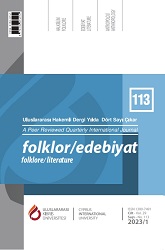Kaşkay Türklerinin Dokuma Çevresinde Gelişen İnanışları
Beliefs of Qashqai Turks within the Arounding of Hand-woven
Author(s): Ashkan Rahmani, Majidreza MoghanipourSubject(s): Customs / Folklore, Ethnohistory, Cultural Anthropology / Ethnology, Sociology of Culture
Published by: Uluslararası Kıbrıs Üniversitesi
Keywords: Qashqai; Turkish beliefs; intangible culture; hand woven; Shamanism;
Summary/Abstract: The Qashqai refer to nomadic people who speak Turkic and live in southwestern Iran, primarily in Fars. Besides Fars, they are dispersed throughout Bushehr, Isfahan, Khuzestan, Kohgiluyeh, and Boyer-Ahmad. Today, this tribe is composed of six major clans: Amele, Dereşorlu, Şeşbeyli, Farsimedan, Küçük Keşküllü, Büyük Keşküllü. In terms of culture and customs, the Qashqai are similar to Turks living elsewhere in Iran and abroad. Like many Turkic-speaking communities, handwoven handicrafts have been an integral part of their culture, and over time, some beliefs have developed about the art of weaving. The proverbs, songs, poems, and expressions they use are partly influenced by shamanism and partly by their local culture. Accordingly, this study intends to determine the beliefs of the Qashqai regarding handwoven art. A field study was conducted in the province of Fars in Shiraz, Marvdasht, Firuzabad, and Farashband. The beliefs associated with Qashqai handwoven products fall into two categories: a) a reflection of the struggle against supernatural forces such as death, the evil eye, ill omens, and bad luck; b) the practice of appealing to supernatural forces; appealing for help from Imam Ali, asking for assistance from the angels, and making wishes. Study results indicate that beliefs about death, colors, the evil eye, wishing, and confronting the devil are mostly linked to Qashqai’s shamanistic beliefs. On the other hand, their beliefs concerning time and the sky, asking for help, and demonstrating power are largely shaped by the region in which they were settled.
Journal: Folklor/Edebiyat
- Issue Year: 29/2023
- Issue No: 113
- Page Range: 313-330
- Page Count: 18
- Language: Turkish

